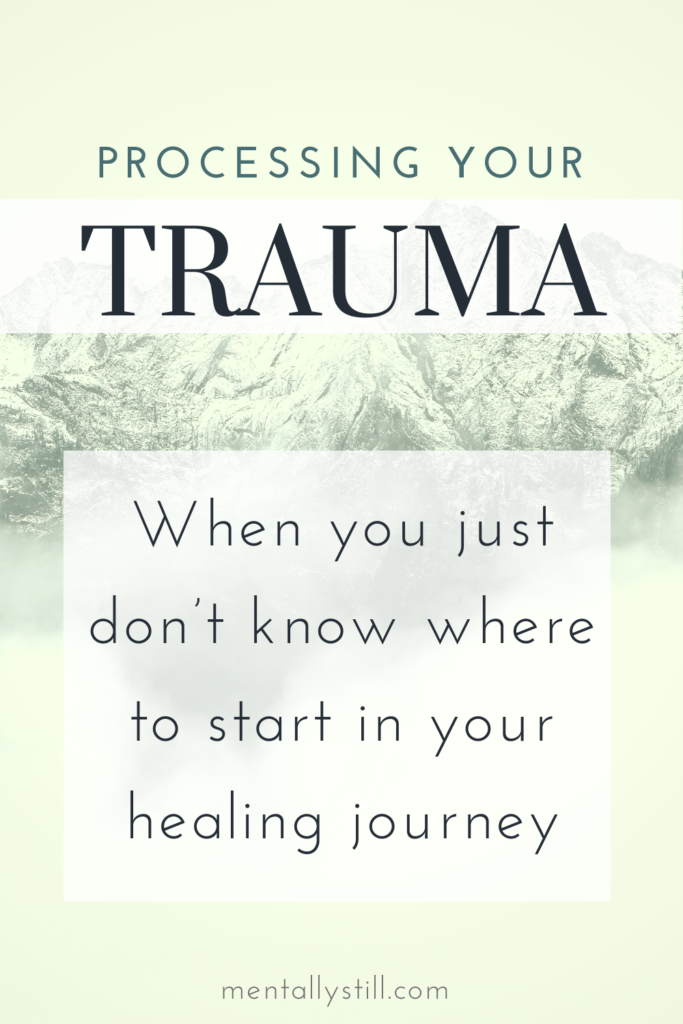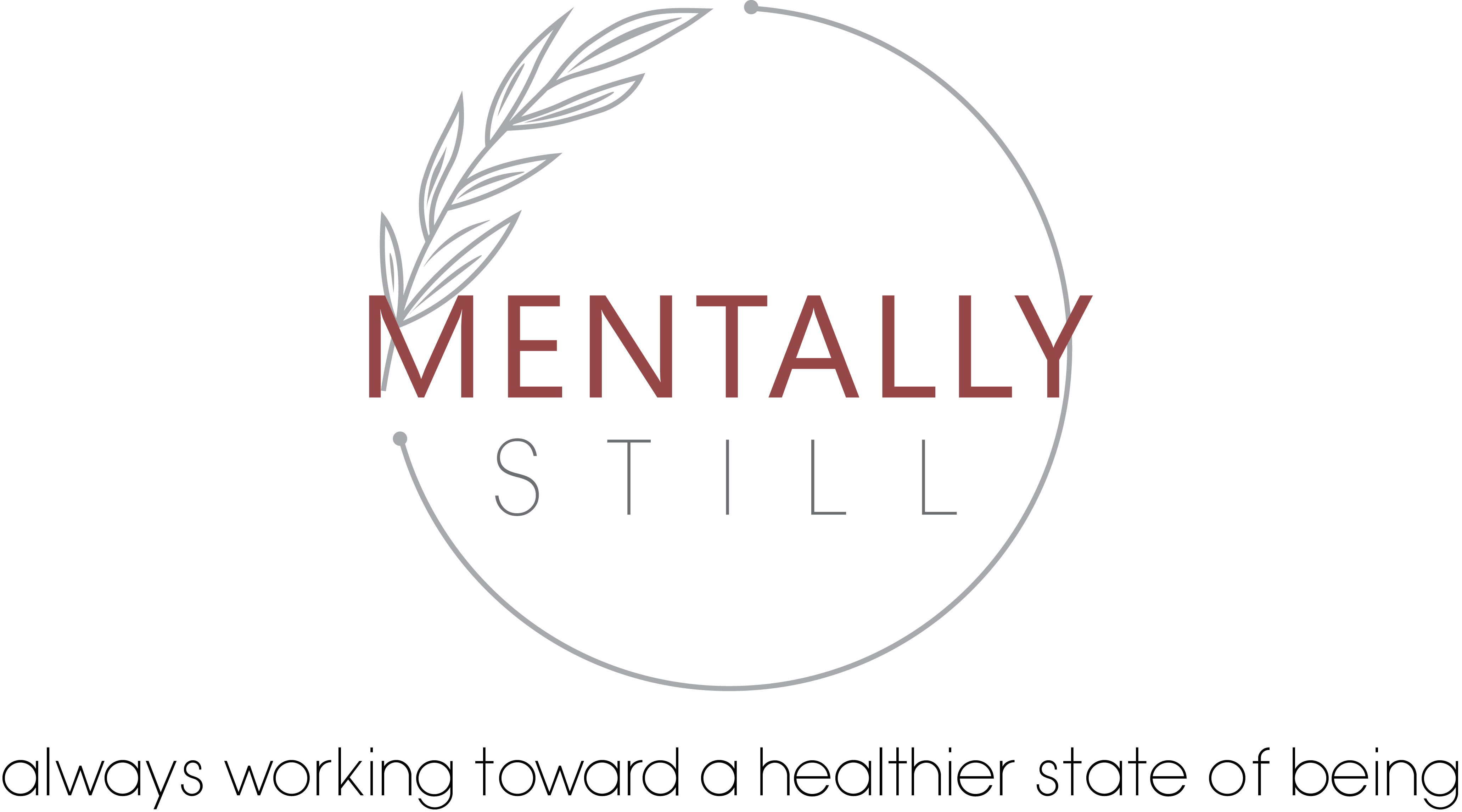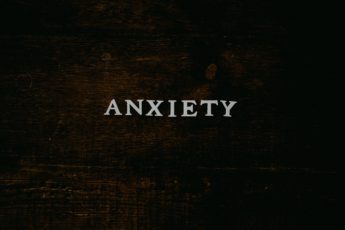A quick note: I am not a healthcare professional. I write my articles based on my own experiences and research. Trauma and processing that trauma looks different for everyone and is a result of many different tragedies, so your journey may be different from mine.
My heart goes out to you, who has experienced such darkness. I highly recommend seeing a mental health professional to receive counsel tailored to you. In the meantime, I hope this helps. All my love.
Trauma. It’s a truly ugly word.
One of the most disturbing things about trauma to me is the fact that when a person is experiencing extreme distress, it changes that person’s brain and the way it functions. It is happening right now.
You can see it. And yet, there’s no stopping it. There is little to nothing you can do to prevent the effects of this significant occurrence; only once the damage is done. It’s going to tear into you whether you like it or not. You can’t ignore it, the monster is already there, uninvited.
Now you have to live with it; unwillingly give it space in your mind and body for it to live, breathing dark and disturbing thoughts and lies into your head.
Always remember, you didn’t do anything to make this happen and you did not deserve this.

Facing Your Mountain
But I have good news; you can pick, hammer, and bulldoze it down enough so that the darkness isn’t screaming anymore, but just a whisper. A manageable whisper.
There are many tools out there that, like a pick-ax, help you pick away at your mountain. Tools that, like a hammer, help you smash and crumble the boulders in your way. There are even tools that, like a bulldozer or a wrecking ball, help to crush, blast, and level your mountain.

It will take time, and it requires much effort on your part. Sometimes it’ll just be a small step, sometimes it will be a truly life-saving breakthrough.
Every step forward is a step closer to well-being and is worth celebrating. Every step, big or small, takes part of this weight off of your shoulders. I have left multiple trauma counseling appointments feeling lighter, even when I went into those appointments with doubts in my mind that it would even help.
And steps back are normal. Mountains go up and down, then back up, then back down. It’s okay, you can still move forward.
Eventually, you can level this mountain that you face. You can, and will climb it, even though you may not want to. It may not feel like it, but healing can be found on that mountain and you will get there, and you will learn a lot about yourself in the process.
Once you get to the other side you might come across some of the leftover rocks and bumps from the trauma from time to time, but you can still come out of it standing tall, no matter how many times you stumble.
I am hopeful that I can give you some tools to help you step forward today.
Permission To Process Your Trauma
First, I want you to know that your trauma and your feelings around this trauma are valid.
I took comfort when I read that trauma isn’t so much about what happened, but the impact it had on you emotionally. While it’s so easy to try to dismiss your trauma because you think someone else had it worse, the overwhelming emotional stress of what you went through is real and deserves to be addressed.
Yes, your trauma is valid and you’re allowed to take the time you need to recover.

Now Is The Time To Address And Resolve
Your brain is trying to make sense of what is or what already happened. It’s trying to fill in the blanks with the limited tools it has now to work through this. When my mother was diagnosed with a terminal disease when I was 8, my collection in my tool box was very small.
Remember when I said that trauma is changing the way your brain works? If you’re not giving yourself and your brain the tools it needs to work through this, the brain gets sick, and over time, it can get worse.
This Is Not Your Authentic Self
Sometimes, the weight of the trauma is not even that obvious. That darkness can be incredibly sneaky, increasing its presence slowly. You become irritable, depressed, physically and mentally exhausted, volatile, completely overwhelmed, unable to handle stress, maybe even numb, and you may not catch that this may be caused by unresolved trauma.
I have personally experienced this and I started to believe that this is just the person I am; a broken vessel that just doesn’t work right. Turns out that a giant part of that was some unresolved traumas that I went years and years without addressing because I didn’t even realize that I needed to.
It whispers thoughts into your head that you would never come up with on your own; that you’re worthless, guilty, shameful, and in severe cases, that you want to end your life. It depletes your reserve for handling stress.
Your self esteem can be shattered and you may feel that you’re a bad person because you can’t control your emotions. You may even hurt the ones around you whom you love so much.
No, this is not your authentic self. You are inherently good and capable of finding happiness. Period. You have the power to get through this.

Related post: Someone who has unprocessed trauma may experience severe anxiety. There are lots of things you can try in my article that is specifically written for coping with anxiety.
Label The Trauma As It Is
You don’t have to downplay what happened. Again, your trauma, your feelings, your healing journey is valid. Be completely honest with yourself.
I once listened to a wonderful and strong woman who was emotionally abused by someone she loved very much. The abuser was severely depressed and heart-breakingly took their own life. It was a devastating loss. Through this woman’s great sorrow, she learned to label her experience as it really was. That yes, she really had been emotionally abused by this person, a hard truth to accept, but she also learned to separate the true nature of her loved one and the actions they took as a result of mental illness.
I saw my childhood through rose-colored glasses for years before I gave myself permission to take those glasses off and see things for what they really were.
We don’t want to sound dramatic or seem like we’re just seeking attention. We don’t want to burden others. We’re afraid of being judged. But once we confront our traumatic experiences as what they truly are, we are so much better able to see what needs healing within ourselves. How do you repair a car when you don’t know what’s broken? You can’t until you find the problem.

Taking Off the Rose-Colored Glasses
I didn’t have a horrible childhood. It’s important to recognize the positive too and there are many many things about my childhood that were really great.
I just had some really hard trials that I had to go through and I thought that because I did have a great childhood, I wasn’t allowed to complain about it. Nope. It’s okay to acknowledge the fact that living my life as a pre-teen then teenage girl with a mother who loved me, but was completely incapable of being a mother to me, was agonizing. For years.
It’s okay for me to acknowledge that it really did affect me in very arduous ways.
That trauma influenced a lot of the decisions I made growing up and had a huge part in the making of an imperfect woman who struggles with mental illness. Once I addressed the pain and started to understand the outcomes of that pain, I was able to forgive and give myself some much needed love and grace. And I think you will too.
There are certainly many, many people out there who will find a new power within themselves once they confront their traumatic experiences and the effects they had on them, yourself included.

Assign Blame Where It Belongs
There are, of course, different kinds of trauma and an infinite number of ways to acquire it. For instance, (sorry to keep talking about it) there is my experience with my mother. Nobody was doing anything to me or hurting me. Not even God was to blame for my trials.
But unfortunately, there are plenty of people who have been grievously wronged by other human beings. I read something once that was specifically written for those who have been sexually abused or assaulted but applies to numerous crimes where a perpetrator and a victim are involved. I’m paraphrasing the best I can:
You did not do anything to make this happen and you did not deserve what happened to you. Assign blame where it belongs; on the [perpetrator].
I really wish I could find the source again so that I could give them credit. I’ll keep trying.
It was the perpetrator’s choice to do something wrong. They made the decision, not you. Stop blaming yourself because you think that maybe you did something that helped it happen or caused it to happen. Stop picking the event apart, pointing out every little thing you could have done differently.
You can definitely take note of ways you can help prevent it from happening again, but for the sake of assigning blame, stop. It was their choice to do something that was wrong. Not yours.

How To Cope With Trauma
There are so many things that you can try to ease the burden you’re carrying. Here are just a few. Pick whatever you think will work best for you in the time that you’re in.
Don’t overwhelm yourself by trying to take on too much at once. Practice one or two at a time and then add on as you feel comfortable with the tools you picked up before.
We all experience and process trauma differently, so be gentle with yourself and give yourself room to experiment what works and what doesn’t. Don’t get discouraged when change doesn’t happen as fast as you’d like or if you get off track for a little bit. Practice, and you will move forward with your life.
Some Inspiration:
- Talking about what happened can be extremely therapeutic. You might have to push yourself out of your comfort zone, but it’s worth it to lift some of that weight off your shoulders. As soon as I got a different trauma out that I had kept to myself for years and let someone else in, I finally didn’t have to go through this alone anymore. It was incredibly relieving. I wrote a whole post about opening up to others so that you can get the help you need here.
- Know your limits. While it’s great to get to the point where you can talk about it, forcing yourself to do too much too early is counterproductive and can set you back. Once I started trauma therapy, I was working on these “homework assignments” from my counselor practically all waking hours for a few days until I just got mentally drained and wanted to take a break from thinking about it so much. Do that. Take your breaks and revisit it when you can.
- Write. Writing is another great way to get the facts and your feelings out. You don’t have to continue giving it space in your mind, taking up your precious energy. When you feel like you still just cannot talk about it out loud, this can be the perfect alternative for now. Once you’ve written to your heart’s content, burn it. Bury it. Hold a ceremony, like a funeral for the trauma. Say a few words about how you’re moving on and how you’re taking back control. Say goodbye. Don’t keep it to go revisit it and reopen old wounds.

- Avoid drinking and drugs! Alcohol is a depressant and absolutely, 100% will make it worse! Please don’t trade temporary distraction for true, lasting healing and happiness. And while we all know that drugs are bad, weed is a whole other ball game. It can be incredibly medicinal for some, and counterproductive for others. If this is an avenue you are considering, please do your own research, talk to a doctor or mental health professional about it, and be responsible in your consumption.
- Essential oils. I love essential oils. The Cheer blend by DoTerra was amazing for me while battling postpartum depression. Lavender is a superstar for its calming effects and it has so many other uses. Lemon, orange, and ylang ylang are mood boosters (I put all three together in my diffuser), and valerian root will knock you out if you need a good night’s sleep, which brings me to our next tool.
- Sleep! Make sure you get enough good quality sleep! The first question my psychiatrist would always ask me at each appointment was “How have you been sleeping?” This is definitely one of the best things you can do for your mental health. Make it a top priority.
- Mindfulness and meditation can redirect the brain from panic and anxiety when you find yourself lost in the memories of your trauma. You can literally rewire your brain to replace bad thoughts and tendencies with good ones. There are lots of ways to practice mindfulness and meditation that I encourage you to look up, but the one that’s been working really great for me lately is to close my eyes, then take a deep breath in, making sure my tummy is moving with each breath, not just my chest. With that breath, I envision light (or love) going into my heart. Take a second deep breath and envision light going to your brain. With the third breath, the light is going to your navel, the center of your body. Then with a fourth and final breath, picture the light filling your entire body.
- Get some fresh air. Go for a walk. Ride a bike. Drive to somewhere scenic where you can enjoy a beautiful view. It can be hard to push yourself to do something like this, but I once saw a reel on Instagram by This Is Bipolar where she looked irritated to go on a walk and it said “Going on a stupid walk for my stupid mental health.” It made me laugh.

- Have different sensory objects around that are either visual, audible, or tactile. Sensory toys are often used to calm and distract a child and can be beneficial for adults as well. I like having things with different textures in my house, like a furry pillow or rug, those sequin pillows that change colors when you run your hand across them, squishy stress balls, etc. Turn on some calming meditation music or if you need loud music that matches your emotions, do that!
- Pet an animal. I don’t think I need to go into depth with that one. We all know how our pets can lift our spirits. There’s definitely a reason why there are therapy dogs in some counseling offices.
- Hug someone. Physical affection “not only increases oxytocin production; it also reduces secretion of cortisol, the stress hormone.” (quote from pennmedicine.org)
- We hear it so often that it can get annoying. Exercise. It doesn’t have to be an intense workout, but get your heart rate up, even for just a few minutes. Dance, jog in place, or do squats while you watch tv. I like to jump on the trampoline with my kids, even if I can only last for 5 or 10 minutes.
- Don’t isolate yourself. Socialize. Find a support group or have a friend over. Take it slow if you need to, but don’t shut everyone out.

We could go on, but we’ll stop here
That was a lot of information. I hope this article gave you some solace and insight to help you make sense of and process your trauma so that you can move on with your life in happiness and good health.
The sun will shine again someday and you will find light in life again. I promise.
All my love, my friend.
Until next time.
If you found this helpful, pin it on Pinterest and follow me for more content on mental health and wellbeing!







